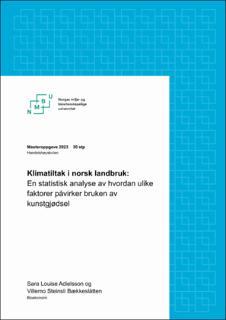| dc.contributor.advisor | Kyrre Rickertsen | |
| dc.contributor.author | Adielsson, Sara Louise | |
| dc.contributor.author | Bækkeslåtten, Villemo Steinsli | |
| dc.date.accessioned | 2023-07-12T16:27:18Z | |
| dc.date.available | 2023-07-12T16:27:18Z | |
| dc.date.issued | 2023 | |
| dc.identifier | no.nmbu:wiseflow:6839501:54591553 | |
| dc.identifier.uri | https://hdl.handle.net/11250/3078354 | |
| dc.description.abstract | Det er nødvendig å implementere klimatiltak i Norge for å redusere de nasjonale utslippene. Det hevdes i samtlige klimaplaner at en reduksjon i bruk og etterspørsel av kunstgjødsel er et viktig klimatiltak i det norske landbruket. Tiltaket skal innføres samtidig som det skal oppnå matsikkerhet, landbruk over hele landet, økt verdiskapning og bærekraft. Den totale gjødslingen skal ikke nødvendigvis reduseres, men alternativer til kunstgjødsel skal benyttes i større grad.
Formålet med denne studien er å forstå hvordan ulike faktorer påvirker bruken av kunstgjødsel. Dette kan styrke kunnskapsgrunnlaget for fremtidig innføring av klimatiltak i det norske landbruket. Ved bruk av spørreundersøkelse har vi undersøkt hvordan ulike faktorer påvirker bøndenes sannsynlighet for å redusere bruken av kunstgjødsel. Bøndene er den sentrale parten i en transformasjon til et mer klima- og miljøvennlig landbruk, og er sentrale aktører i vår undersøkelse. Undersøkelsen legger vekt på sosioøkonomiske faktorer, kunnskap, holdninger, tilgjengelighet, regelverk og driftsøkonomiske faktorer. Spørreundersøkelse ble sendt ut til 3.579 bønder og vi fikk 959 svar, som tilsvarer en svarprosent på 25%. Utvalget besto av korn- og husdyrbønder på Østlandet, og grønnsaksprodusenter fra flere deler av landet. Resultatene ble analysert med logistisk regresjon for å svare på problemstillingen og tilhørende hypoteser.
I motsetning til funnene fra tidligere forskning, finner vi ingen signifikant sammenheng mellom økt utdanning og en reduksjon i bruken av kunstgjødsel. Funnene fra regresjonsanalysen viser at høy utdanning og lønnsomhet påvirker negativt. Økt villighet til å tilegne seg ny kunnskap om klimatiltak fremstår som den mest avgjørende faktoren for å redusere bruken av kunstgjødsel. Vi fant videre at større gårdsbruk, heltidsbønder, og bruk av dekkvekster, fangvekster og vekstskifter fremmet en reduksjon av kunstgjødsel. I tillegg var bondens holdninger til klimatiltak, samt tilgjengelighet på organisk gjødsel, viktige faktorer som fremmer en reduksjon i bruken av kunstgjødsel. | |
| dc.description.abstract | The implementation of climate measures in Norway is crucial to mitigate national emissions. The climate plans of Norway emphasize the significance of reducing both the usage and demand of synthetic fertilizers as a climate measurement in the Norwegian agriculture. However, this climate measure must be implemented in a manner that ensures food security, nationwide agriculture, increased value creation, and sustainable agricultural practices. It is noteworthy that total fertilization should not be reduced in the Norwegian agriculture, but the usage of alternative organic fertilizers should increase.
This study investigates the factors influencing a reduction of synthetic fertilizer in the Norwegian agriculture. This can strengthen the knowledge base for future implementation of climate measurements in Norway. Socioeconomics, knowledge, attitudes, availability, regulations, and economics were the factors examined. To collect data a survey was conducted on Norwegian farmers. The survey was distributed to 3.579 farmers, and we got a response rate of 25% with a total of 959 answers. The selection consisted of grain and livestock farmers from the county Østlandet and vegetable producers nationwide. Logistic regression was used to analyze responses, and to answer the research question.
Unlike previous studies, the findings from the regression analysis indicates that education does not have an impact on the reduction of synthetic fertilizers. High education and profitability have a negative impact on the reduction of synthetic fertilizers. Notably, the willingness to acquire new knowledge was the most significant factor contributing to the reduction of synthetic fertilizers. Furthermore, larger farms, full-time farmers and the use of cover crops, captive crops and crop rotations promotes a reduction in the use of synthetic fertilizers. Additionally, farmers attitudes towards climate action and availability of alternatives were crucial factors to promote a reduction of synthetic fertilizer use. | |
| dc.language | nob | |
| dc.publisher | Norwegian University of Life Sciences | |
| dc.title | Klimatiltak i norsk landbruk: En statistisk analyse av hvordan ulike faktorer påvirker bruken av kunstgjødsel | |
| dc.type | Master thesis | |
